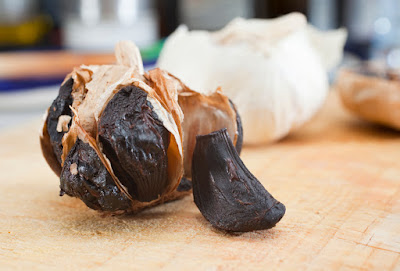Black Garlic: 4 Reasons You Should Eat It, How To Make It And Recipes
While black garlic certainly doesn’t sound all that appetizing – in fact, you might envision it to simply be burned garlic, it’s actually made by “fermenting” whole bulbs of fresh garlic in a humidity-controlled environment in temperatures that range from 140 to 170 degrees Fahrenheit for 14 to 40 days. There are no additives, preservatives, or burning for that matter, of any kind.

Once it’s removed from the heat, the garlic bulbs are placed in a dry area at room temperature to oxidize for 10 to 14 days. The process results in garlic that is matte-black and gooey soft with a somewhat chewy texture and a flavor similar to balsamic vinegar – the normal pungency taste of garlic disappears, which means that even those that can’t stand garlic may like black garlic.
As the Nordic Food Lab describes it, “The process is not, strictly speaking, fermentative—the transformation is due not to microbial metabolism but in part to enzymatic breakdown (the heat denatures alliinase, the enzyme that converts non-volatile alliin into volatile allicin, the compound responsible for fresh garlic’s pungency) and in part to the Maillard Reaction, a cascade of chemical reactions that produce the dark colour and complex, caramelized flavor.”
In fact, food connoisseurs say that it’s a perfect “sweet meets savory” mix of molasses-like richness with slight tangy garlic undertones and a melt-in-your mouth consistency similar to soft, dried fruit. Its appearance on the “Top Chef” and “Iron Chef” reality TV shows put it into the spotlight as one of the latest and greatest true “superfoods.”
In Taoism mythology, black garlic was even rumored to grant immortality – and, while we certainly can’t guarantee that, there is little doubt that it offers a ton of health benefits. It’s packed with nearly twice the amount of antioxidants as raw garlic – researchers have found that the aging/fermenting process appears to double its antioxidants. And, not coincidentally, a 2009 study conducted in Japan found that it was more effective than fresh garlic for reducing the size of tumors.
Black garlic is also filled with a high concentration of sulfurous compounds. One of the compounds in particular, s-allylcycteine or SAC, has been scientifically found to offers numerous health benefits, including the inhibition of cholesterol synthesis – which in layman’s terms means that it can lower the risk of cardiovascular disease.
It can be eaten alone, on bread, or used in any of your favorite dishes, much as you would regular garlic – but you’ll enjoy even greater health benefits than you would from this already very powerful herb.
If that’s not enough reason to get you to consider getting creative in your kitchen and putting black garlic to work in your meals, these reasons are sure to get you inspired.
4 Reasons To Start Eating Black Garlic
1. Treat type 2 diabetes
Those who suffer from type 2 diabetes know that the condition can wreak havoc on your health due to the effects of oxidative stress. Uncontrolled diabetes may lead to serious complications like kidney disease, heart disease, nerve damage and vision problems – sometimes even blindness.
The potent antioxidants in black garlic specifically can lessen oxidative stress caused by increased blood sugar levels. Multiple studies have found that its high level of antioxidants exert an even stronger effect than regular garlic and could be even more helpful in preventing complications of diabetes.
2. Improve cholesterol levels
While “good” cholesterol, or HDL, is essential for survival, keeping LDL, or “bad” cholesterol in check is important for reducing the risk of heart disease, stroke and premature death. Although raw garlic has gotten most of the praise when it comes to heart healthy benefits, black garlic has recently been the subject of multiple studies, and as it has a slightly different phytochemical makeup compared to raw garlic, as mentioned, it offers even greater benefits for supporting the heart.
A 2014 study conducted at Chonbuk National University Hospital in South Korea found that participants who took black garlic extract daily for 12 weeks say an average increase in HDL (“good” cholesterol), as well as a decrease in allpoprotein B in blood lipids – something that’s considered to be a strong indicator of heart disease risk.

Once it’s removed from the heat, the garlic bulbs are placed in a dry area at room temperature to oxidize for 10 to 14 days. The process results in garlic that is matte-black and gooey soft with a somewhat chewy texture and a flavor similar to balsamic vinegar – the normal pungency taste of garlic disappears, which means that even those that can’t stand garlic may like black garlic.
As the Nordic Food Lab describes it, “The process is not, strictly speaking, fermentative—the transformation is due not to microbial metabolism but in part to enzymatic breakdown (the heat denatures alliinase, the enzyme that converts non-volatile alliin into volatile allicin, the compound responsible for fresh garlic’s pungency) and in part to the Maillard Reaction, a cascade of chemical reactions that produce the dark colour and complex, caramelized flavor.”
In fact, food connoisseurs say that it’s a perfect “sweet meets savory” mix of molasses-like richness with slight tangy garlic undertones and a melt-in-your mouth consistency similar to soft, dried fruit. Its appearance on the “Top Chef” and “Iron Chef” reality TV shows put it into the spotlight as one of the latest and greatest true “superfoods.”
In Taoism mythology, black garlic was even rumored to grant immortality – and, while we certainly can’t guarantee that, there is little doubt that it offers a ton of health benefits. It’s packed with nearly twice the amount of antioxidants as raw garlic – researchers have found that the aging/fermenting process appears to double its antioxidants. And, not coincidentally, a 2009 study conducted in Japan found that it was more effective than fresh garlic for reducing the size of tumors.
Black garlic is also filled with a high concentration of sulfurous compounds. One of the compounds in particular, s-allylcycteine or SAC, has been scientifically found to offers numerous health benefits, including the inhibition of cholesterol synthesis – which in layman’s terms means that it can lower the risk of cardiovascular disease.
It can be eaten alone, on bread, or used in any of your favorite dishes, much as you would regular garlic – but you’ll enjoy even greater health benefits than you would from this already very powerful herb.
If that’s not enough reason to get you to consider getting creative in your kitchen and putting black garlic to work in your meals, these reasons are sure to get you inspired.
4 Reasons To Start Eating Black Garlic
1. Treat type 2 diabetes
Those who suffer from type 2 diabetes know that the condition can wreak havoc on your health due to the effects of oxidative stress. Uncontrolled diabetes may lead to serious complications like kidney disease, heart disease, nerve damage and vision problems – sometimes even blindness.
The potent antioxidants in black garlic specifically can lessen oxidative stress caused by increased blood sugar levels. Multiple studies have found that its high level of antioxidants exert an even stronger effect than regular garlic and could be even more helpful in preventing complications of diabetes.
2. Improve cholesterol levels
While “good” cholesterol, or HDL, is essential for survival, keeping LDL, or “bad” cholesterol in check is important for reducing the risk of heart disease, stroke and premature death. Although raw garlic has gotten most of the praise when it comes to heart healthy benefits, black garlic has recently been the subject of multiple studies, and as it has a slightly different phytochemical makeup compared to raw garlic, as mentioned, it offers even greater benefits for supporting the heart.
A 2014 study conducted at Chonbuk National University Hospital in South Korea found that participants who took black garlic extract daily for 12 weeks say an average increase in HDL (“good” cholesterol), as well as a decrease in allpoprotein B in blood lipids – something that’s considered to be a strong indicator of heart disease risk.
3. Allergy relief and more
Whether you suffer from nasal or skin allergies, black garlic can bring significant relief. Studies have found that it actually has the ability to turn off genes that cause inflammation and allergic reactions in the first place. It’s also known to strengthen the immune system, due to its abundance of antioxidants, which is important whether you have allergies or not.
In addition to warding off allergies, as garlic is considered a natural antibiotic it can even help to battle viruses and infections. A 2012 study conducted at Washington State University found that garlic was 100 times more effective than two top antibiotics for fighting a bacteria known as Campylobacter, which is responsible for many intestinal illnesses throughout the world. It’s been used for medicinal purposes for thousands of years, include to help fight the plague in the 18th century.
Garlic has the ability to kill bacteria as well as viruses, fungus’s and pathogens without harming beneficial gut flora, unlike antibiotic drugs.
4. Help heal the liver from alcohol damage
The liver is one of the only organs that can heal itself from damage – if good habits are developed before it’s too late. Alcoholic liver disease occurs as a result of damage from oxidative stress, due to trying to break down the alcohol. That damages liver cells, which can lead to inflammation and scarring over time.
Scientists have found that black garlic can help reduce inflammation and even help reverse the damage of alcohol on the liver, as well as to remove fat that’s accumulated on the river, thanks to its potent antioxidant properties, once again.






